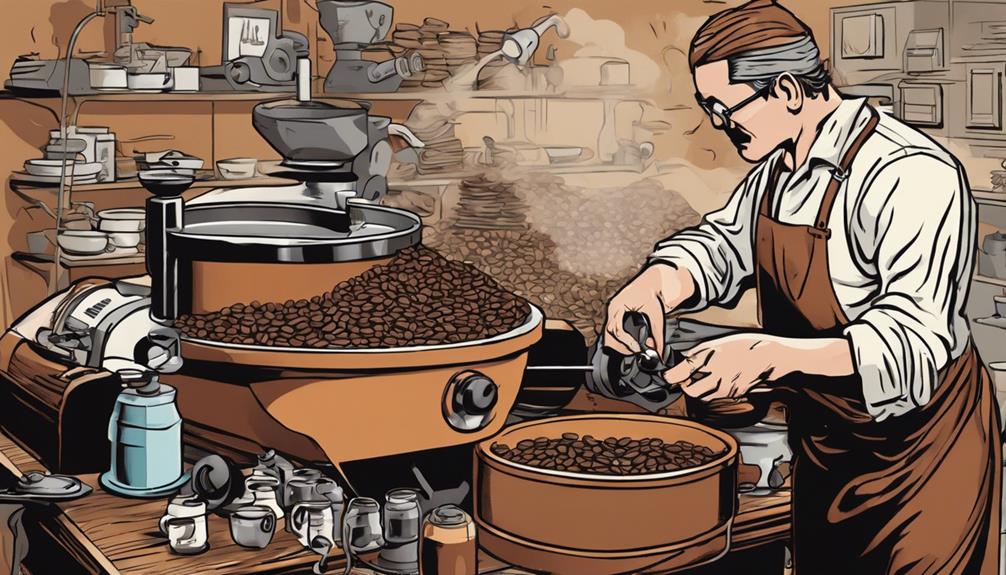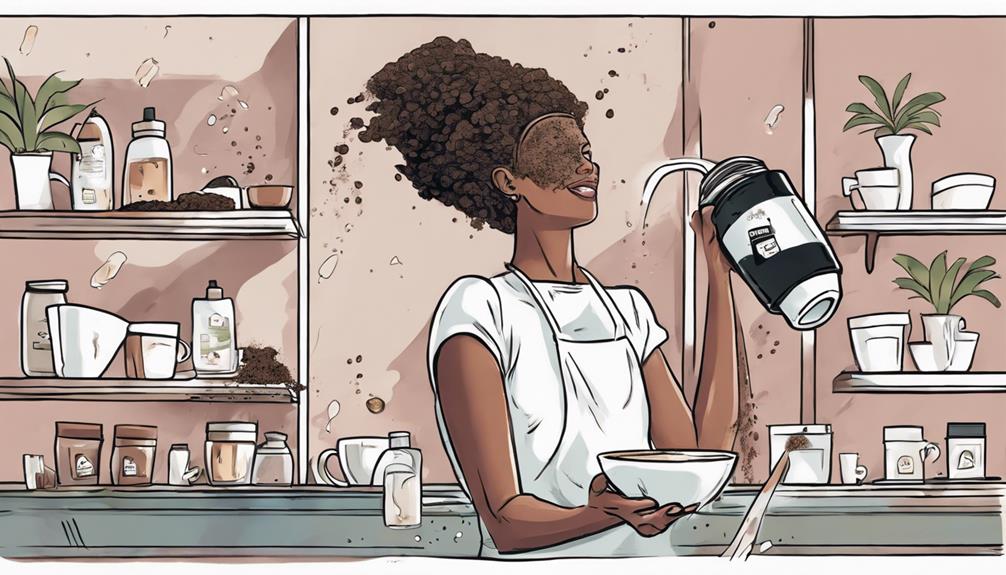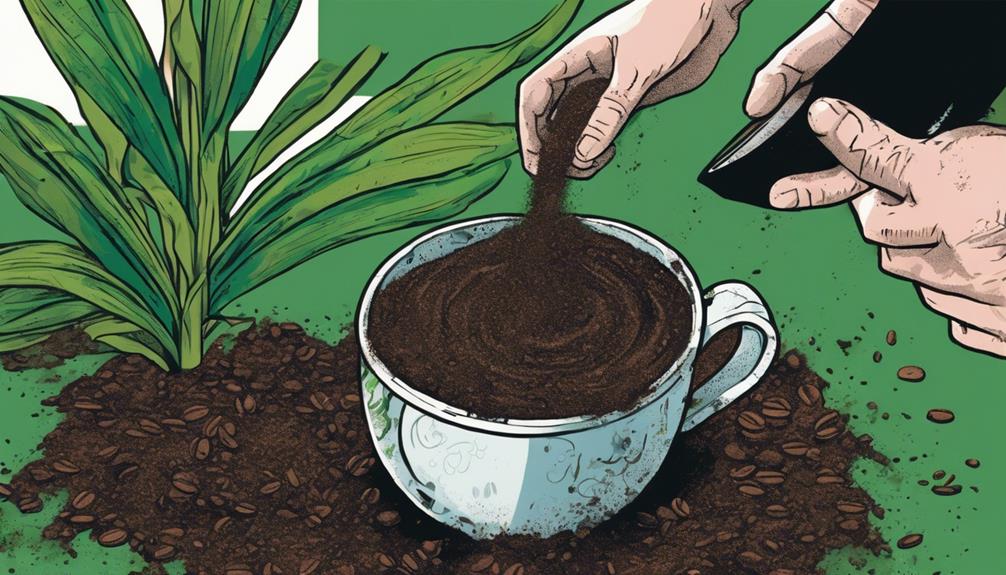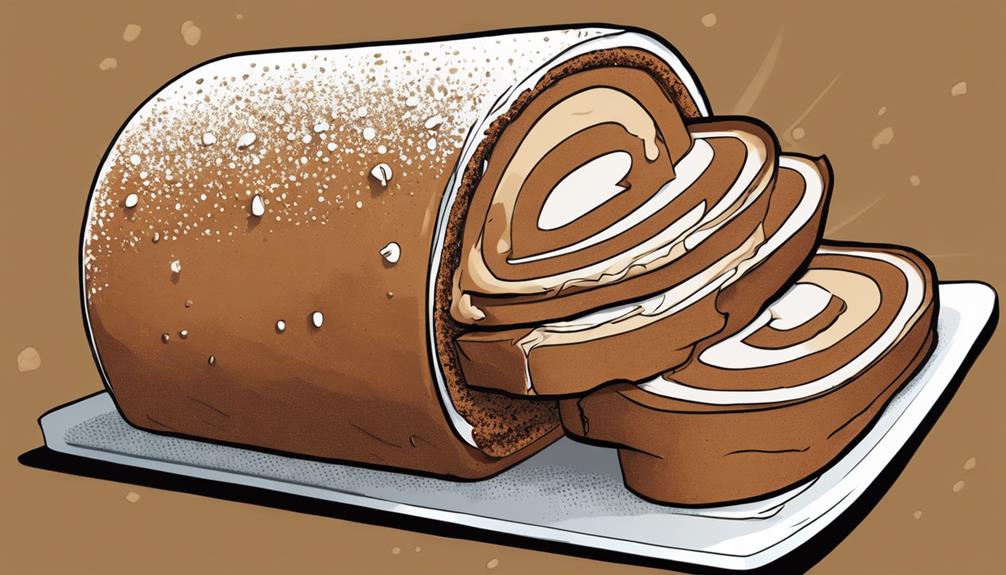To become a master of coffee roasting, start by getting hands-on experience in cafes and working as a barista to develop an understanding of different flavors. Seek guidance from experienced roast masters, utilize digital tools for precision, and stay updated on industry trends. Carefully choose your beans, oversee the roasting process, and experiment with creating unique blends. Learn how time, temperature, and technique affect the final product. By following these steps, you will be on your way to crafting rich, flavorful brews, exploring a variety of tastes, and sharing your love for coffee. Remember, practice is key in mastering the art of coffee roasting!
Key Takeaways
- Gain hands-on experience in cafes to learn coffee flavors and techniques.
- Find a mentor among experienced roast masters for guidance and knowledge.
- Utilize digital tools for precision in roasting processes.
- Stay updated on industry trends to enhance skills and knowledge.
- Experiment with different settings and maintain detailed roast logs for consistency.
Becoming a Roast Master
To become a Roast Master, start by gaining hands-on experience in cafes to learn the intricacies of coffee roasting. Begin as a barista to grasp the diverse coffee flavors and understand customer preferences.
It's essential to find a mentor among experienced roast masters who can impart valuable insights and techniques. Embrace digital tools for roasting to achieve precision and consistency in your craft.
Stay current with industry trends by attending coffee festivals, where you can network, showcase your skills, and build connections within the coffee community.
Coffee Roaster Job Description
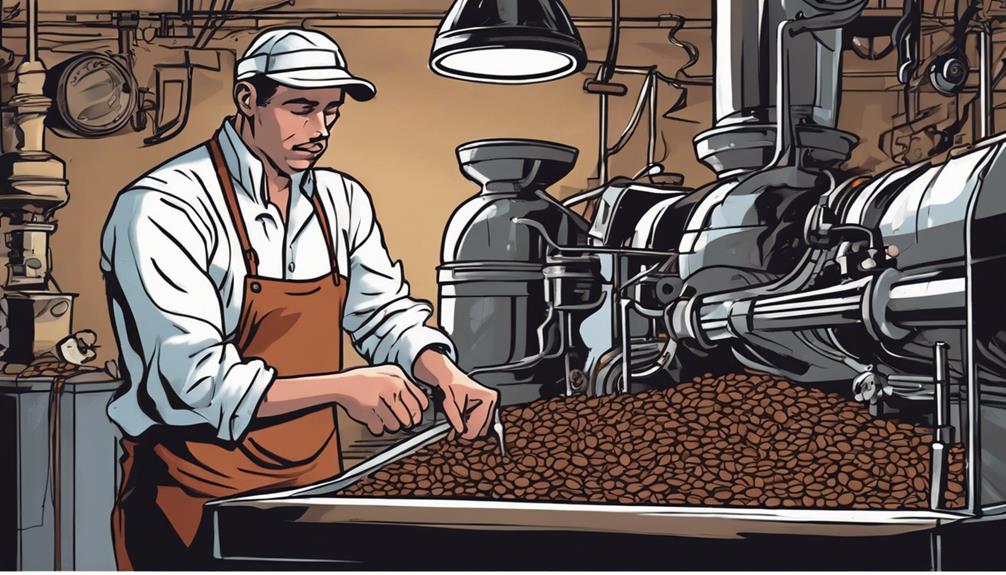
A coffee roaster selects beans from importers, controls the roasting process, and monitors temperature and bean cracking to achieve the best flavor profiles. They load green coffee beans into the roasting drum, where they meticulously oversee the roasting process to develop unique blends for flavor enhancement.
Key responsibilities of coffee roasters include sourcing high-quality green beans, roasting them to perfection, and ensuring adherence to strict quality standards.
Utilizing their expertise, coffee roasters play a crucial role in the coffee industry by transforming raw green beans into beautifully roasted beans that are enjoyed by consumers worldwide. Their meticulous attention to detail and understanding of the intricacies of the roasting process are essential in maintaining the quality and consistency of the final product.
Benefits of Coffee Roasting
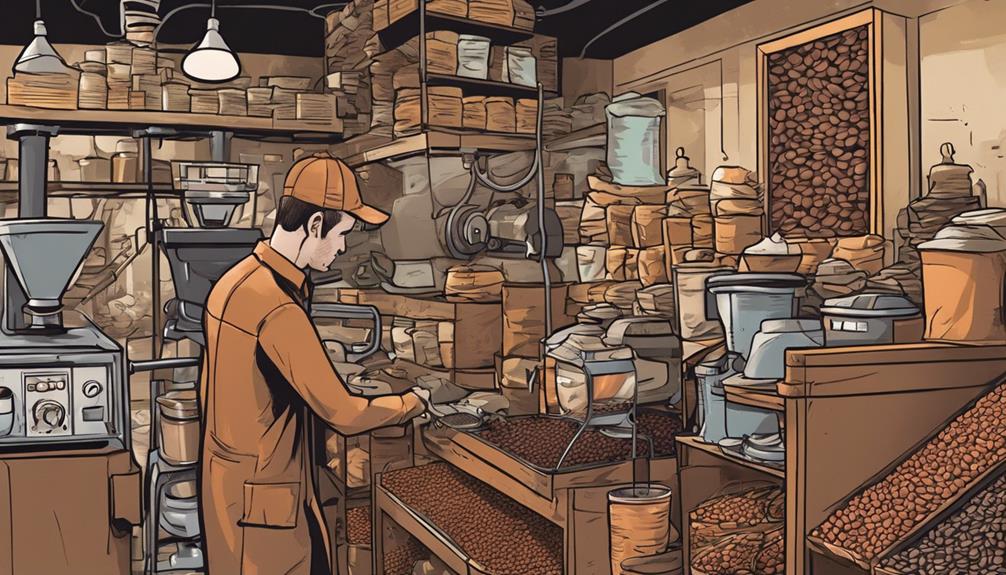
Through coffee roasting, you harness the potential to create rich, flavorful brews that delight the senses and bring people together. By transforming green coffee beans into aromatic delights, you can explore a world of diverse flavors and aromas. The art of roasting offers a sensory experience like no other, allowing you to tailor each batch to perfection.
Specialty coffee roasters have the opportunity to give back to their communities by hosting coffee tours, classes, and educational events. This not only spreads awareness about the coffee industry but also fosters a sense of unity among coffee enthusiasts. Experimenting with different roasting profiles and flavors not only hones your skills as a roaster but also provides a creative outlet for expression.
Roasting coffee goes beyond just creating a delicious cup; it's a chance to inspire others in the industry and share the joy of coffee with a passionate community.
Coffee Roasting Fundamentals
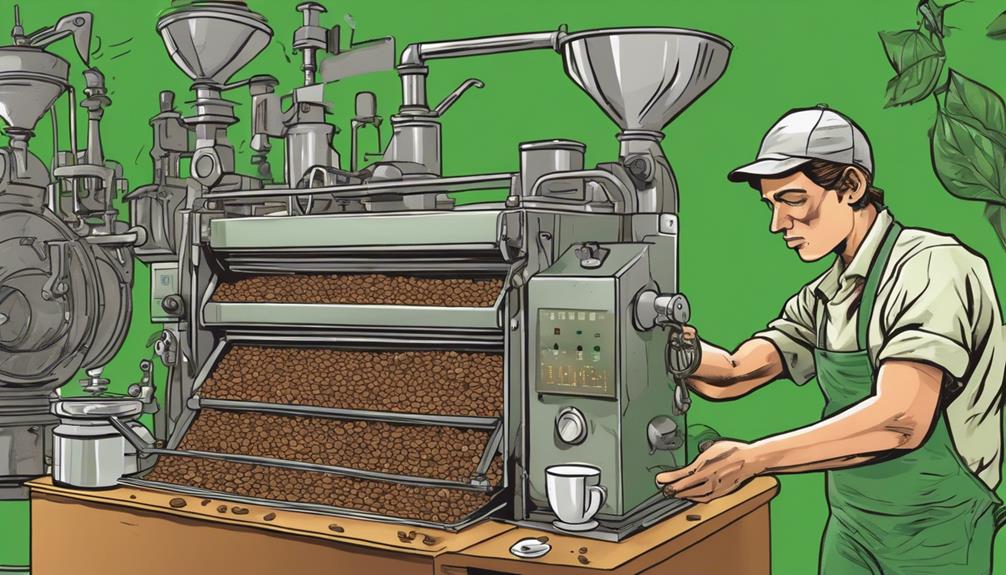
Mastering the fundamentals of coffee roasting involves understanding the impact of time, temperature, and technique on achieving desired taste and aroma profiles. Selecting high-quality green coffee beans is pivotal as it influences the final flavor and aroma. Roasting profiles serve as guides during the roasting process, allowing manipulation of time and temperature for specific flavor outcomes. The roasting process involves evaporation of moisture and chemical reactions that develop the coffee flavors. Mastering roasting techniques includes experimenting with different settings, maintaining detailed roast logs, and refining profiles through taste tests and feedback.
| Coffee Roasting Fundamentals | |
|---|---|
| Coffee Roasting Machines | Programmable Roasting |
| Green Coffee Grading | Roasting Techniques |
| Specialty Coffee Association | Roast Small Batches |
In coffee roasting, understanding and controlling variables such as time, temperature, and technique are essential to achieving the desired flavor profiles. Experimenting with different roasting techniques, utilizing programmable roasting machines, and following the guidance of reputable organizations like the Specialty Coffee Association can help in mastering the art of coffee roasting.
Starting in Coffee Roasting
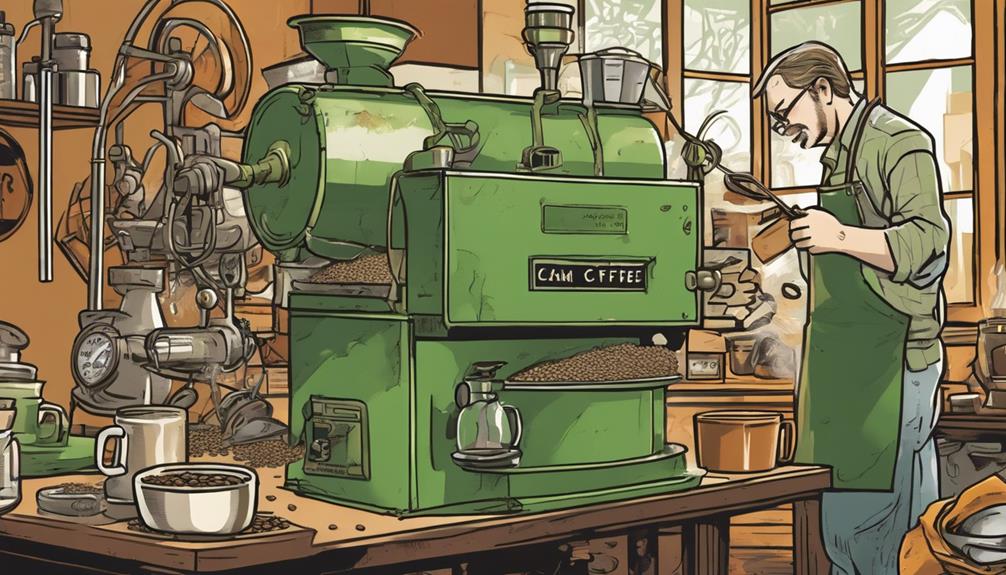
To kickstart your journey in coffee roasting, consider starting in entry-level roles at cafes to build a solid foundation. By working as a barista, you'll develop a palate for different coffee flavors and begin understanding the intricacies of the roasting process.
Seek mentorship from seasoned roast masters to hone your skills and learn the ropes of advanced roasting techniques.
Entry-Level Roasting Roles
Starting out in coffee roasting typically involves assisting experienced roasters in the roasting process. Entry-level roles often serve as a stepping stone for individuals with barista experience looking to explore the world of coffee roasting. These positions provide valuable hands-on experience in learning about various coffee flavors and roasting techniques.
As an entry-level roaster, you may be tasked with monitoring roasting temperatures to make sure the beans are roasted to perfection. Additionally, you might also be responsible for recognizing important stages like bean cracking during the roasting process. Working in roasteries or cafes in entry-level roles not only offers practical experience but also opens up opportunities for mentorship from seasoned professionals.
Embrace the learning curve these positions offer, as they lay a solid foundation for your journey towards mastering the art of coffee roasting.
Learning Coffee Flavors
To excel in your coffee roasting journey, immerse yourself in learning about coffee flavors by starting as a barista. This role will help you develop a palate for different coffee profiles and aromas.
Experiment with different roasting profiles and coffee blends by smelling the beans before and after roasting. Attend cupping sessions to refine your ability to identify diverse flavors in coffee and understand the impact of roasting profiles on flavor development.
Practice tasting and describing coffee notes to enhance your sensory skills. By actively engaging in these activities, you'll deepen your knowledge and appreciation for the intricacies of coffee flavors.
Remember that learning coffee flavors is an ongoing process that requires dedication and a keen sense of taste. Embrace the journey of discovering new and exciting flavor profiles as you progress in your coffee roasting endeavors.
Mentorship in Roasting
Engage with experienced roast masters to kickstart your journey in coffee roasting through mentorship. Learning from these seasoned professionals provides invaluable insights into the nuances of the roasting process.
With hands-on training, you'll get the chance to experiment with different profiles, developing a keen palate for coffee flavors along the way. Asking questions and receiving feedback directly from your mentor will help accelerate your learning curve significantly.
Through mentorship in roasting, you'll build a strong foundation essential for mastering techniques and progressing towards becoming a skilled coffee roaster. The guidance of experienced roast masters is key to understanding the intricacies of the craft and refining your skills.
Embrace this opportunity to learn from the best, absorb their knowledge, and apply it to your own roasting journey. Remember, a mentor can provide the guidance and support needed to reach your full potential in the world of coffee roasting.
Roasting Profiles and Techniques
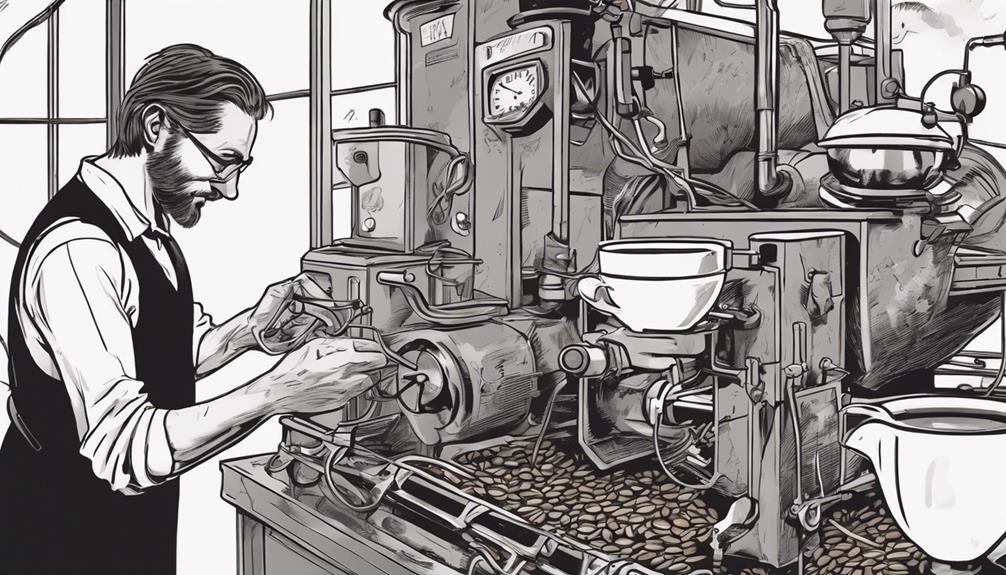
When mastering coffee roasting, understanding flavor manipulation techniques and the importance of keeping detailed roast logs are key.
By experimenting with different settings and documenting your results, you can refine your roasting skills over time.
Starting with single-origin beans allows you to appreciate the natural flavors and learn how to bring out diverse profiles in your coffee.
Flavor Manipulation Techniques
By adjusting time and temperature settings, roasting profiles serve as a guide for developing the flavor of coffee beans. These flavor manipulation techniques allow you to personalize flavor outcomes according to your preferences. Experimenting with different roasting profiles can lead to various flavor profiles, ranging from light and fruity to dark and bold. It's essential to understand how time and temperature impact flavor to achieve the desired taste in your coffee beans.
Keeping detailed roast logs is vital in this process. These logs help you track and refine your roasting profiles over time, ensuring consistent and high-quality roasts. Whether you prefer a milder brew or a more robust flavor, mastering the art of adjusting roasting profiles will enable you to create coffee that perfectly suits your taste buds.
Roast Log Importance
Keeping detailed roast logs is essential for tracking and refining your roasting profiles over time to maintain consistency and quality in your coffee roasts. By diligently recording key data such as temperature fluctuations and time intervals during the roasting process, you equip yourself with valuable information that can be pivotal in achieving consistent results and desirable flavor outcomes.
Here are some reasons why roast logs are important:
- Replicate Profiles: Roast logs enable you to replicate successful roast profiles accurately.
- Troubleshooting: Detailed records help troubleshoot any issues that may arise during the roasting process.
- Quality Control: Consistent use of roast logs enhances quality control measures, ensuring a reliable and excellent product for your customers.
Coffee Roasting Education

For aspiring coffee roasters, obtaining education in coffee roasting is necessary for mastering the craft and developing professional skills and knowledge.
Online courses such as Boot Coffee Campus and Coffee Chemistry Roasting Courses offer a thorough understanding of professional roasting skills, techniques, and the chemistry of roasting. These courses explore both theoretical foundations and practical applications, covering basics and advanced techniques essential for honing your craft.
By engaging in these courses, you can accelerate your learning curve in coffee roasting, gaining valuable insights into the intricacies of the roasting process. Understanding the chemistry behind roasting is particularly important as it provides a solid foundation for enhancing your skills and knowledge in this field.
Investing time and effort into dedicated programs focused on coffee roasting education will certainly equip you with the expertise needed to excel in the art of roasting coffee beans.
Community Engagement in Roasting
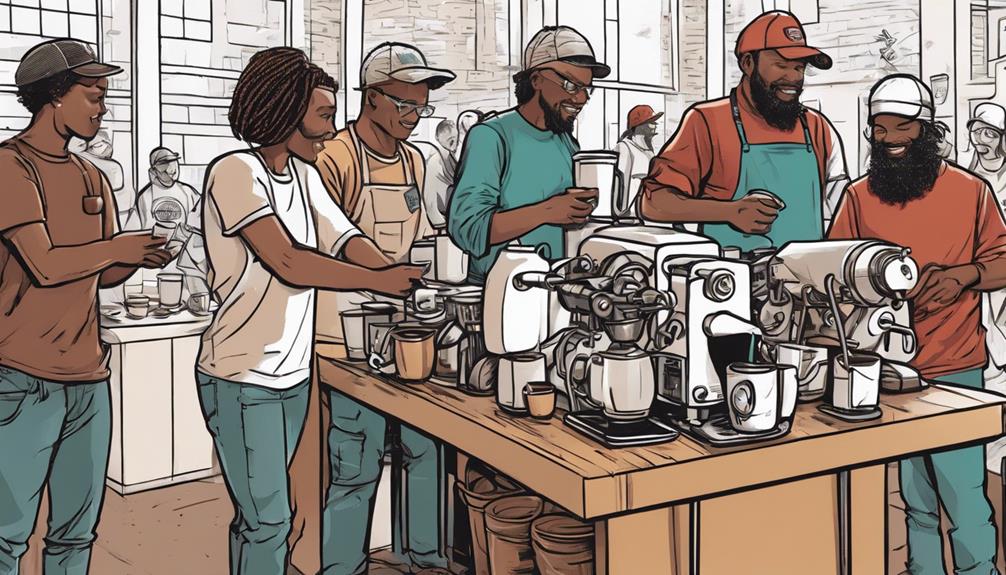
Engaging with the coffee roasting community provides valuable insights and opportunities for growth in your roasting journey. By participating in online forums like Home-Barista and Reddit's r/roasting, you can tap into a wealth of knowledge shared by experienced roasters and enthusiasts. These platforms offer a space to discuss roasting techniques, troubleshoot issues, and stay updated on equipment reviews.
Joining coffee roasting communities allows you to engage in historical discussions, access valuable insights, and connect with a network of like-minded individuals passionate about coffee. Through these communities, you can seek recommendations on green coffee sourcing, share your own experiences, and contribute to the collective learning process.
Mastering Home Coffee Roasting
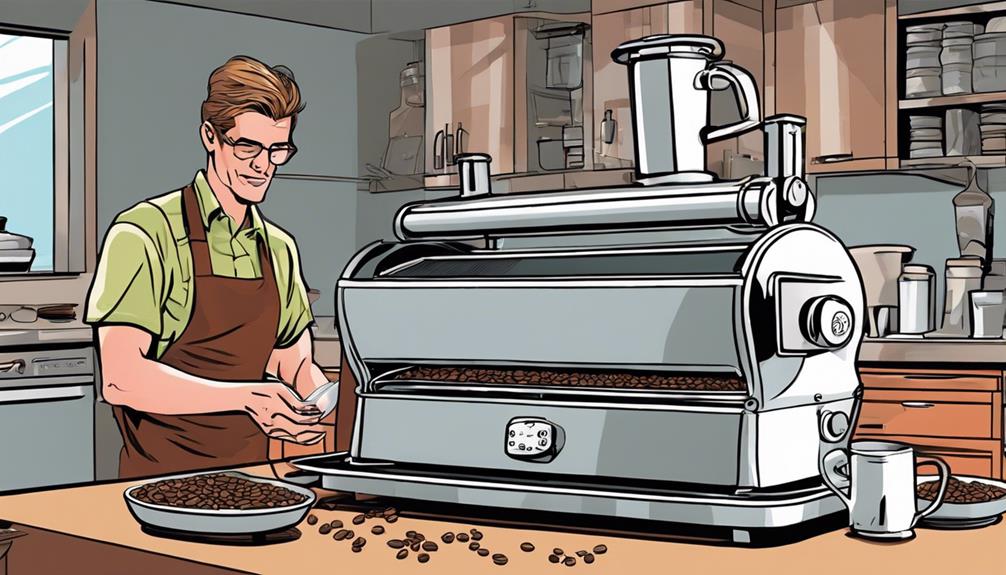
To excel in home coffee roasting, perfecting your roast levels is essential for accessing the full range of flavor profiles.
Home roasting provides an opportunity for customization and control, allowing you to tailor your coffee to suit your preferences. By experimenting with different roast levels, you can discover unique flavor profiles and refine your skills over time.
Developing expertise in home roasting involves exploring the spectrum of roast levels, from light to dark, each offering distinct flavors waiting to be accessed.
Skill development in home coffee roasting also involves consistent note-taking on flavor profiles. By keeping detailed records of your roasts, you guarantee reproducibility and can make adjustments for future batches. This attention to detail not only enhances the quality of your coffee but also allows for continuous improvement in your roasting techniques.
Embrace the journey of home roasting as a platform for creativity, exploration, and mastery of your coffee craft.
Frequently Asked Questions
How Do You Become a Master Coffee Roaster?
To become a master coffee roaster, gain experience in cafes, start as a barista, mentor under experienced roast masters, learn digital tools for precision, and attend coffee events to network and stay updated on industry trends.
How to Become a Professional Roaster?
To become a professional roaster, gain industry experience as a barista, apprentice under roast masters, and utilize digital roasting tools for precision. Attend coffee festivals for networking and exposure to new trends. Consistency and dedication are key.
How to Become the Best Coffee Roaster?
To become the best coffee roaster, start by immersing yourself in the industry. Work in cafes, learn from masters, and attend events. Seek mentorship, use digital tools, and practice relentlessly. With dedication and passion, you'll master the craft.
What Is a Master Roaster?
A master roaster is a skilled professional who transforms green coffee beans into flavorful roasted coffee. They understand the roasting process, manage temperature, time, and flavor development, and continuously refine techniques for excellence.
Conclusion
Now that you have the skills and knowledge to become a master coffee roaster, remember that like a well-crafted cup of coffee, mastery takes time, dedication, and precision. To truly excel in the art of coffee roasting, focus on honing your senses and refining your techniques. Embrace the journey of becoming a coffee connoisseur and immerse yourself in learning about different coffee beans, roasting profiles, and brewing methods. With continued practice and a commitment to excellence, you will undoubtedly become a respected master in the world of coffee roasting. As you continue to develop your skills and deepen your understanding of coffee, you will become a coffee master who is able to create unique and exquisite flavors that tantalize the taste buds. Embrace the challenges and seek out opportunities for growth, always striving to elevate your craft to new heights. Through dedication and a passion for the art of coffee roasting, you will undoubtedly leave a lasting impression as a true master in the field.
Just as the perfect roast brings out the unique flavors of each bean, your journey to becoming a roast master will allow you to reveal your full potential and create something truly exceptional.
Keep honing your craft and never underestimate the power of a perfectly roasted bean. You've got this!
